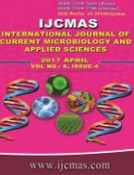


 National Academy of Agricultural Sciences (NAAS)
National Academy of Agricultural Sciences (NAAS)

|
PRINT ISSN : 2319-7692
Online ISSN : 2319-7706 Issues : 12 per year Publisher : Excellent Publishers Email : editorijcmas@gmail.com / submit@ijcmas.com Editor-in-chief: Dr.M.Prakash Index Copernicus ICV 2018: 95.39 NAAS RATING 2020: 5.38 |
Biogas is one of the most important renewable energy source. Biogas normally contains 55 – 65% methane (CH4) and 45 – 55% carbon dioxide (CO2) and trace amounts of hydrogen sulphide (H2S). Raw biogas cannot be used as vehicle fuel as it contains CO2 and H2S which lowers the calorific value and causes corrosion to the storage vessel respectively. Enriching the biogas by removing CO2 and H2S will significantly improve the quality of biogas. The application of biogas either as cooking fuel or engine fuel chooses the type of purification method. In this work biogas enrichment using coconut shell derived granular activated carbon as CO2 adsorbent by pressure swing adsorption (PSA) technique was investigated. The adsorption of CO2 by the adsorbent with varying pressure from 1 to 10 bar were experimentally examined. The results indicated that with increase in pressure adsorption also increases. Activated carbon (AC) showed adsorption affinity towards both CO2 and CH4 at lower pressure. As the pressure increases the material showed little higher affinity towards CO2 than CH4. The maximum methane content obtained after adsorption and CO2 reduction percent found to be 73.9 % and 44.7 % at 8 bar pressure respectively. The material showed lower biogas separation ability in terms of lower CH4 enrichment and lower CO2 reduction. So the selected AC cannot be used for biogas enrichment but it can be used for single gas adsorption.
 |
 |
 |
 |
 |